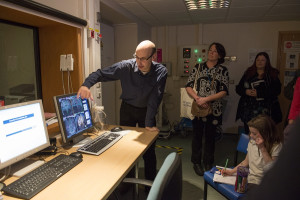Visitors to Oxford’s John Radcliffe Hospital learned how blood flows to and around the brain during a tour of medical facilities. The Friday, September 11 tours were part of the Oxford Open Doors programme of events, where city institutions opened to the public. Friday’s two free tours – which ... READ MORE
News for Preventive Neurology
Sleep deprivation could reduce intrusive memories of trauma
A good night’s sleep has long been recommended to those who have experienced a traumatic event but an Oxford University-led study provides preliminary experimental work suggesting it could actually be the wrong thing to do. Sleep deprivation might prevent people from consolidating memories of ... READ MORE
John Radcliffe visitors see the brain in action
VISITORS and pupils learned how staff at the John Radcliffe Hospital study the brain as part of a series of public events about medical research in Oxfordshire. More than 100 people enjoyed a tour of the Oxford University Centre for Functional MRI of the Brain (FMRIB) on Monday March 16. They ... READ MORE
Bionic eyes give us a look into future of medical technology
BIONIC eyes, lung imaging and pregnancy apps were part of an exhibition revealing life-changing research taking place in Oxford. Members of the public had a rare opportunity to meet surgeons, nurses and clinical researchers who are building the next generation of clinical techniques to ... READ MORE
WATCH: Simple approach to research is key to improving stroke treatment
Stroke is one of the biggest killers in the UK but world class research is helping cut the number of deaths and improve prevention. In the latest Oxford Biomedical Research Centre public talk, clinical neurologist Professor Peter Rothwell outlines leading stroke and related dementia ... READ MORE
Personalised brain stimulation could improve life for Parkinson’s sufferers
Researchers in Oxford have made a landmark breakthrough towards improving the treatment of advanced Parkinson’s disease. The Oxford University team based at the John Radcliffe Hospital has successfully trialled an advanced deep brain stimulation system that actively detects and responds to a ... READ MORE
Discover the a to zzzs of the brain
To celebrate Brain Awareness Week (March 11 to 15), researchers from the Oxford Sleep and Circadian Neuroscience Institute are hosting a series of activities, displays, talks on the subject of Sleep and the Brain. A crack team of neuroscientists will take over the Museum of the History of ... READ MORE
Amputee phantom pain linked to brain retaining picture of missing limb
Changes in the brain following amputation have been linked to pain arising from the missing limb, called ‘phantom pain’, in a study supported by the NIHR Oxford Biomedical Research Centre. Arm amputees experiencing the most phantom limb pain were found to maintain stronger representation of the ... READ MORE
New hope for those with Parkinson’s tremors
A NEW brain stimulation therapy could help supress tremors in people with Parkinson’s disease, according to new research. The non-invasive technique has been pioneered by researchers supported by the National Institute for Health Research (NIHR) Oxford Biomedical Research Centre, a collaboration ... READ MORE
Cannabis pain relief is variable
The pain relief offered by cannabis varies greatly between individuals, a brain imaging study supported by Oxford Biomedical Research Centre suggests. The researchers found that an oral tablet of THC, the psychoactive ingredient in cannabis, tended to make the experience of pain more bearable, ... READ MORE
Remodelling the Brain: an insight into research that could aid stroke recovery
Our brains adapt whenever we learn a new skill, such as juggling and they also adapt after damage such as stroke. In this Oxford Biomedical Research Centre public talk, Professor of Cognitive Neuroscience Heidi Johansen-Berg shows how brain imaging allows us to watch the brain remodel, reorganise ... READ MORE
Study seeks people with memory loss
Research study (SCarlet RoAD) opens to test an investigational medication for the treatment of prodromal Alzheimer’s disease On 20 January 2012 the OPTIMA Project (Oxford Project to Investigate Memory and Ageing: Nuffield Department of Medicine, University of Oxford) based at the John Radcliffe ... READ MORE
Treating sleep problems may be important in schizophrenia
A study of schizophrenia patients has found profound disruptions in their sleep patterns, with half also having irregular body clocks that are out of synch with the pattern of night and day. The Oxford researchers argue that the extent and severe nature of these long-term sleep problems should be ... READ MORE
Stroke feature: restructuring the brain
A Wellcome Trust article highlights the work of Professor Heidi Johansen-Berg at the University of Oxford and her research exploring the structural changes in the brain’s white and grey matter that underlie learning. Understanding the precise cellular nature of those changes may improve diagnosis of ... READ MORE
Treating the brain with tiny electric currents may aid stroke recovery
Tiny electric currents applied across regions of the brain can improve hand movements in recovering stroke patients for a short period, an Oxford University study has demonstrated. The researchers are hopeful that developing this brain stimulation technique further may provide a useful addition ... READ MORE
The amazing story of my father’s brain
The Thomas Willis Oxford Brain collection features in a Sunday Telegraph article by local journalist Vikki Owen. She talks movingly about donating her father's brain to research and his struggle with MS. The Thomas Willis Oxford Brain Collection is a collaborating centre for the Brains for ... READ MORE
Patients tell of their experience of TIAs and minor strokes
Healthtalkonline is a website that provides a rich resource of more than 2,000 people's experiences of health and illness. It’s also a great source of reliable information about conditions, treatment choices and support. Adding to the growing list of diseases covered by Healthtalkonline is a new ... READ MORE
Joint funding for multiple sclerosis research
The Oxford Biomedical Research Centre and the MS Society have joined forces to fund a three year Clinical Research Fellowship to carry out translational research into basic or clinical aspects of multiple sclerosis (MS). The collaboration will support the research of Dr Oliver Leach, based within ... READ MORE
Do you dance like your Dad?
A brain chemical called GABA is the reason why “some people dance like Fred Astaire – while others have the natural rhythm of Ann Widdecombe”, the Daily Mail has reported. The news is based on a study involving 12 healthy young adults who had their brains stimulated with electrodes to alter ... READ MORE
Maternal stroke history linked to Myocardial Infarction risk in women
Women whose mothers had a stroke are at increased risk for both stroke and myocardial infarction, new research has shown. In a study of sex-of-parent and sex-of-proband interactions for family history of stroke in acute coronary syndrome (ACS) patients, Amitava Banerjee of the University of ... READ MORE


